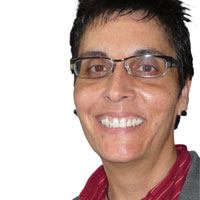POWER 25
• 2010 Power 25: Reinventors
It’s a crucial moment for aquatics. Here’s a look at who’s changing the game, for good!
• 2009 Power Forces
The current economic crisis is likely to shape much of what happens in 2009. We’ve asked past Power 25 honorees to weigh in on how it might affect aquatics — and what professionals can do to weather the storm.
You won’t find many environmental health professionals as dedicated to aquatics as Colleen Maitoza.
“For most environmental health agencies, recreational health is the stepchild to food safety,” says the supervising environmental health specialist with the Sacramento County (Calif.) Environmental Management Department. “Aquatics has always been my love. It’s a program I’ve always really had a passion for.”
A 26-year veteran with Sacramento County, Maitoza also spent a couple of years working for the state. A native Californian, she graduated from San Jose State University with a bachelor’s degree in microbiology. She discovered environmental health working summers doing swimming pool inspections in Santa Clara County, Calif.
“I’ve spent most of my career in the plan review part of environmental health, reviewing new construction on new pools, waterparks and restaurants,” Maitoza says.
When the Model Aquatic Health Code project came up, she was invited to participate as a member of the Operator Training Technical Committee and then as part of the Steering Committee.
“The whole MAHC process has been enlightening for me,” she says. “It was eye-opening to look at codes from a more performance-based approach, and I like the fact that we’ve got so many parties that come to the table and work within the group.”
As a member of the Steering Committee, Maitoza represents the concerns of other environmental health professionals.
“I’m able to look at the proposals and give input as to whether its enforceable or not,” she says. “I think I bring that perspective.”
Beyond that, Maitoza says she’s tried to listen. “Everyone has their opinions, but everybody is very respectful, and I think that’s a really positive thing,” she says. “I haven’t always experienced that in other meetings or arenas that I’ve been involved with.”
So will the MAHC be a help to all those environmental health officials and others who, unlike Maitoza, don’t have a strong commitment to aquatics? That is her hope.
“Because recreational health is traditionally the stepchild, providing money and manpower to create aquatics programs and update codes just doesn’t happen,” she says. “Having the MAHC where it’s already done saves a tremendous amount of time and money.”
